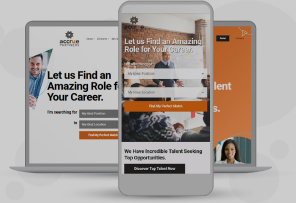Anyone who has built and launched a website has likely encountered an oft-repeated acronym: SEO (search engine optimization). And while you might not have ever done SEO yourself, you've benefited from it in the past: Every day, search engines like Google employ complex algorithms to sift through more than 400 billion web pages and deliver the most relevant results.
Website owners like you use SEO techniques and strategies to get their websites to the top of the search results for relevant user queries. But SEO is not a one-time endeavor — Google and other search engines change often, and ongoing SEO ensures your website stays in front of the people you want to reach. Just as a physical storefront requires regular maintenance and updates to stay competitive, your website needs ongoing SEO to remain visible amidst the ever-changing digital landscape.
The ABCs of SEO: What is Ongoing SEO and Why Does It Matter?
Don't let the techy jargon intimidate you. HubSpot — considered one of the gold standards for SEO and digital marketing advice — defines SEO as simply a collection of strategies and tips that "expand a company’s visibility in organic search results'' and help "drive more visitors to the company’s website, increasing their chances for more conversions which leads to more customers and more revenue."
SEO Connects the Search Engine Algorithms With Your Website's Content
Regardless of your website's goal or industry niche, all SEO techniques have one thing in common: They look at ways to optimize your website's content, keywords, and links to help search engines rank your website higher in the search results when someone searches for something related to your keywords, content, or brand name.
According to HubSpot, SEO needs to address the key factors that all search engines use to determine the value of your website's content — and therefore how high in the search results your website or specific landing page should appear:
- The intent or meaning behind why someone is searching for a specific term or question
- The relevance between what someone searches for, and the content on your website
- The quality of your content (for instance, a website about physical exercise written by certified personal trainers is deemed by Google to be higher quality than a website where the articles are written by non-experts)
- The performance of your website, such as how long it takes a page to load and whether it works well on mobile devices
Static SEO Versus Ongoing SEO: Why It Matters to Stay Fresh and Keep Your SEO Updates Current
As users' web behavior changes and technology evolves, search engines proactively adjust their algorithms.
If you aren't conducting ongoing SEO maintenance and upgrades, a well-optimized website today can quickly become obsolete tomorrow, causing your search rankings to drop and attracting fewer organic visitors. Google itself updates its algorithms several thousand times per year, including significant "major" changes every few months that dramatically change how it crawls and ranks content. For example, Google's infamous Panda update changed how it ranked how-to lifestyle content on the Internet, causing one major content publisher to lose a whopping $6.4 million of traffic and advertising nearly overnight.
How Ongoing SEO Influences Your Website Strategy
Staying abreast of changes to SEO techniques and strategies provides important guidance to your content, marketing, and overarching website strategy. For example, it can dictate or influence:
- How much content you publish, and the content's format, length, and focus
- How you incorporate other forms of media on your website, including images, video, and audio
- How you organize content on your site, including landing page layouts and your site's navigation
- What keywords and target users your website focuses on
Embrace the Power of Ongoing SEO
Caroline Forsey, an expert in thought leadership and marketing content, looked at the survey results from more than 400 of the world's leading web analysts to predict the biggest SEO trends of 2024. According to her data, some of the top changes in SEO strategies this year include:
- A heavier emphasis on expertise, meaning the content on your website should come from experts in your related field (including bylines and author bios that demonstrate the author's credentials and experience on the topic they're writing about)
- A renewed emphasis on first-person, credible content, especially as more websites generate high volumes of low-quality AI content (Google itself has announced upcoming changes to tackle low-value articles created by AI)
- A priority on websites that are deemed trustworthy, such as e-commerce sites with well-rated customer service, or content sites that do a good job of citing trustworthy research and statistics
- Bonus points on content that is creative and original and doesn't simply rehash content found on other sites
Of course, these SEO trends will inevitably change every year, and ongoing SEO will keep you competitive no matter what Google, Bing, and other search engines do. No matter your website's industry or content strategy, ongoing SEO requires that you:
- Focus on keeping your content fresh and high quality, including new blog posts or regularly refreshing and updating old product descriptions or articles
- Conduct keyword research often, since the terms or phrases that your core audience uses will evolve over time
- Maintain your website's overarching performance, such as mobile-friendliness as mobile devices evolve, and page load speed
- Build a diverse portfolio of high-quality backlinks from authoritative websites within your niche, which may include outreach campaigns, getting others in your industry to write guest blogs, and participating in online forums or communities
- Keep on top of technical and performance metrics, such as scanning your site for broken links (and fixing the links you uncover) and using tools like Google Analytics and Google Search Console to track organic traffic, keyword rankings, click-through rates, and conversion rates
- Stay on top of algorithm changes so you can adapt your SEO strategy in real-time
Some website owners think of SEO as the first step of their promotional strategy. But it's less a first step, and more an ongoing journey to ensure you, your brand, and your content stay relevant in such a competitive atmosphere. Whether you choose to go it alone and take a DIY approach to SEO, or you choose to consult with a digital marketing and SEO agency, check in often and make sure your SEO evolves as the world around you evolves.
If you are running an online business or using your web presence as the primary way to attract new customers, everything is about conversions. Your entire marketing plan is likely designed around a sales funnel that draws people from initial interest into a purchase or ongoing relationship with your business. Part of the reality we all live with is that people fall out of this funnel. If they didn't, we would all be selling a lot more! We know that, no matter what we do, some qualified customers will never complete a purchase. In fact, if you run an online store, you are likely only converting 2-5% of your site's visitors.
There are many approaches to dealing with low conversion rates. The most typical tactic is to get more visitors. If your conversion rate is only 3%, you can still, in theory, double your sales by doubling the visitors to your site. So, maybe we spend more on Google Ads or run another campaign on Facebook. But, even if we can increase the number of visitors, we are still dealing with a meager conversion percentage.
But, what if, instead of pouring more money into low conversion rate visitors, we spent some effort reaching out to those who visited our website, but never completed a purchase? These are people who already had some level of interest in what we have to offer. They have demonstrated that interest by visiting. Maybe some of them will never make a purchase. But, chances are, some of them just need a little reminder.
This is where remarketing and retargeting can become the most useful tools in your marketing toolkit. Think of all the reasons someone might visit your site and not follow through. Maybe they weren't quite ready. Perhaps they wanted to do a little more research. Maybe they received an email they needed to attend to or decided they needed to know what was happening on Facebook.
What is Remarketing? And What is Retargeting?
It may be easier to understand the concepts of remarketing and retargeting by thinking of things in a physical brick and mortar setting. Picture someone coming into your store on their lunch break and finding something they really like. But, their lunch break ends before they have a chance to buy it. Wouldn't it be great if, on their way home, they could see a billboard for your store featuring that same item? Virtually impossible, but a great idea. Well, in the online world, that is entirely possible through remarketing and retargeting. This type of marketing uses email or customized ads to re- engage potential customers who have already shown an interest in what you offer.
Remarketing and Retargeting are often used interchangeably. While they have the same goal and are based on the same premise, they are slightly different. Remarketing typically refers to an approach using email as the vehicle for following up with potential customers, where retargeting uses online advertising explicitly targeted at potential customers that have already visited your website.
How do Remarketing and Retargeting Work?
If you do any online shopping, chances are you have already experienced both of these. If you have ever added a product to your online shopping cart and then left the site without checking out, you may have received an email from that same website. Maybe it was just a friendly reminder that you didn't complete your transaction. Or, perhaps it was an incentive like a discount to encourage you to come back and finish your purchase. That is remarketing. If you have ever browsed a website and then later noticed ads for the same site while scrolling through Facebook or searching for something on Google, you have experienced retargeting. These are both efforts to re-engage you, the potential customer through highly targeted and personalized marketing.
The Benefits of Remarketing and Retargeting
Chances are you have already invested time and money in getting people to visit your website. Every time a potential customer slips out of your sales funnel, you are losing return on your investment (ROI). Remarketing and retargeting are ways to recoup and expand your ROI. Remember, it is all about conversions. Because remarketing and retargeting are reaching out to customers that have already expressed an interest in what you offer, you will see higher conversion rates from this type of marketing. Also, since it is reaching out to consumers who are already familiar with you, this is a chance to increase your brand exposure. Exposure builds familiarity and, done correctly, trust. So, when this customer is ready to buy, your brand is at the top of their mind.
Getting Started with Remarketing and Retargeting
Getting started can be as simple as beginning to collect email addresses for remarketing efforts. Retargeting will require getting connected to Google Ads, Facebook, or Twitter. However, it is best to start with a plan and some goals for your marketing efforts. We would be happy to help you better understand the benefits of remarketing and retargeting for your business. Our digital marketing team has extensive experience with this type of marketing and can help your business get started driving leads and increasing sales.



